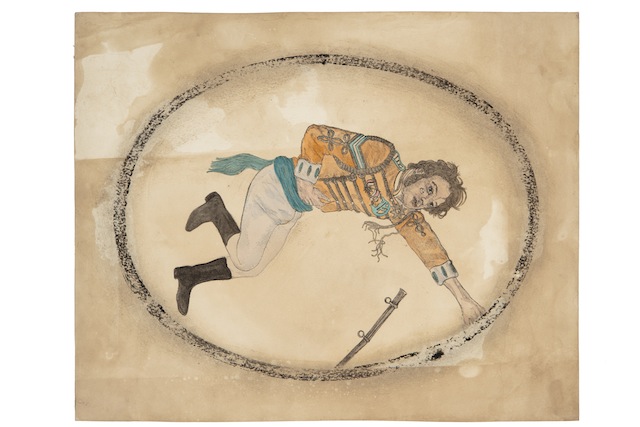“The Charge of the Light Brigade” is poem by Alfred Lord Tennyson about an outnumbered group of British cavalrymen getting walloped by the Russians during the Crimean War of the 1850s. Emphasizing the soldiers’ courage rather than their foolhardiness, it’s meant to invoke a wave of awe. I know because my mom read it to me when I was seven and admonished me when I didn’t react. I just couldn’t see what was so great about going into a fight when you know you’re going to lose so badly or why that made for such a great poem.I finally got a better sense of what’s between the lines recently when acclaimed electronic music producer and shepherd of the LA beat scene Daedelus explained how “The Charge of the Light Brigade” inspired his new album The Light Brigade, out on Brainfeeder September 29. To a seven-year-old, conflict is a simple clash between opposing sides, but Daedelus strips away the homogeneity of the mobs and hones in on the individual people that compose them. The real tragedy of war occurs at this level, and Daedelus has captured its gravity in sound. Through layer upon layer, the producer interprets the battle not as a marvel of discipline but as a “meditation on mortality.”The Light Brigade is Daedelus’s telling of the story of the Crimean War through subjective, personal means. He forgoes the pomp and praise afforded historic accounts of war and dives straight into perspectives from the battlefield—a soldier, a general, a civilian—manifested in an abstract patchwork of vocal samples, melodies, and textural sounds. Daedelus explains, “I feel like you tell stories not in the broad strokes but the intimate spaces.” Appropriately, his understanding of the war is one that appreciates its complexities and varying dimensions.“The Crimean War wasn’t just regimented groups of people shooting each other and then marching and stabbing each other. It was modern, covert warfare techniques—telegraphs for communication, railways for transportation, and generals sitting on the sidelines telling the frontlines to run around on the battlefield,” Daedelus told me on the phone. This was the beginning of war as we know it today—more firepower, faster movement, and remote leadership moving the pieces from a safe distance. No more rousing speeches on horseback before descending upon the enemy. Tennyson’s poem seems to ride humanity’s final surge of true military grandeur. In addition to the new technology of battle, the Crimean War also marked the beginning of modern war news coverage. Journalist William Russell and photographer Roger Fenton are credited as two of the first war reporters for their ongoing coverage for Britain’s Times, revealing the carnage of the conflict as well as the horror of being a soldier at a time when amputation on the battlefield was the chosen remedy for a bullet wound. In illustrating the Crimean War through individual pairs of eyes, Daedelus pays homage to the pioneering journalism that first emerged in this conflict, conveying the horrors without the peril of experiencing it.War had become far more explosive and bloody, but medicine was still in the Stone Age. This strife found its way between the layers of The Light Brigade. “Most people in the older Crimean War didn’t die from the war, they died from disease and rampant infections,” says Daedelus. “People back then were dying off the battlefield from infected gunshot wounds, trench foot, and the lack of medical supplies—all kinds of ancillary things. I want to tell that story.”It’s clear from The Light Brigade’s lead single “Onward” that this is not the joyous Victorian cakewalk of Daedelus's tailoring-themed 2011 album Bespoke, nor does it rest on the abstract sonic patchwork of last year’s Drown Out, which grieves the death of Daedelus’s friend and labelmate Austin Peralta. “Onward” is a spare, haunting melody topped with vocalist Young Dad’s mantra: “You don’t have to say it, I’m on my way, I’m not going alone.” It challenges the notion of gung-ho soldiers approaching the battle thirsty for blood. The militant aggression on the surface is stripped away so that only the voice of fear, duty, and humanity remain echoing within the walls of a helmet.This isn’t the first time Daedelus has tackled war themes in his music and perhaps not the last. He based his 2010 album Righteous Fists of Harmony on the Boxer Rebellion in China at the turn of the century. For his next thematic work, he plans to crack open the Boer Wars of South Africa. In each of these wars, Daedelus has found thematic connections to the present and even noticed a certain strain of mysticism.“The backdrop of a lot of this stuff is magical tradition meeting modern traditions," he told me. "In the Boxer Rebellion, martial artists believed they had magical powers to be immune from guns. The Crimean War was fought over the Russian Orthodox Church’s divine power to control the region that is the seat of their magic traditions."
In addition to the new technology of battle, the Crimean War also marked the beginning of modern war news coverage. Journalist William Russell and photographer Roger Fenton are credited as two of the first war reporters for their ongoing coverage for Britain’s Times, revealing the carnage of the conflict as well as the horror of being a soldier at a time when amputation on the battlefield was the chosen remedy for a bullet wound. In illustrating the Crimean War through individual pairs of eyes, Daedelus pays homage to the pioneering journalism that first emerged in this conflict, conveying the horrors without the peril of experiencing it.War had become far more explosive and bloody, but medicine was still in the Stone Age. This strife found its way between the layers of The Light Brigade. “Most people in the older Crimean War didn’t die from the war, they died from disease and rampant infections,” says Daedelus. “People back then were dying off the battlefield from infected gunshot wounds, trench foot, and the lack of medical supplies—all kinds of ancillary things. I want to tell that story.”It’s clear from The Light Brigade’s lead single “Onward” that this is not the joyous Victorian cakewalk of Daedelus's tailoring-themed 2011 album Bespoke, nor does it rest on the abstract sonic patchwork of last year’s Drown Out, which grieves the death of Daedelus’s friend and labelmate Austin Peralta. “Onward” is a spare, haunting melody topped with vocalist Young Dad’s mantra: “You don’t have to say it, I’m on my way, I’m not going alone.” It challenges the notion of gung-ho soldiers approaching the battle thirsty for blood. The militant aggression on the surface is stripped away so that only the voice of fear, duty, and humanity remain echoing within the walls of a helmet.This isn’t the first time Daedelus has tackled war themes in his music and perhaps not the last. He based his 2010 album Righteous Fists of Harmony on the Boxer Rebellion in China at the turn of the century. For his next thematic work, he plans to crack open the Boer Wars of South Africa. In each of these wars, Daedelus has found thematic connections to the present and even noticed a certain strain of mysticism.“The backdrop of a lot of this stuff is magical tradition meeting modern traditions," he told me. "In the Boxer Rebellion, martial artists believed they had magical powers to be immune from guns. The Crimean War was fought over the Russian Orthodox Church’s divine power to control the region that is the seat of their magic traditions."
Advertisement
Throughout his musical career, Daedelus has employed the running theme of his fascination with the cultural and technological transitions that took place throughout the Victorian Era. In his music, you’ll hear harpsichords alongside pulsing synthetic drums. Throwing back to the fashion of 19th century dandies, he rocks elaborate tuxedos from the era while performing on a jumbo, wood-paneled audio controller called the Monome. Very often, his robotic glass sculpture Archimedes bends the light around him as he plays. He doesn’t exclusively use orchestral samples, but when he does, it’s like watching a concert in the 1880s while wearing augmented reality goggles. His style and sound have kept him a fixture in LA electronic music and beyond, and his influence shaped the scene that birthed Flying Lotus, Gaslamp Killer, and countless other future legends. Perhaps none of his contemporaries approach their album subject matter quite in the way Daedelus does, though.
Advertisement

Advertisement
Advertisement
Daedelus began working on The Light Brigade months before the recent Crimean conflict, in which Russia covertly sent forces into Ukraine in order to gain control in the wake of the Ukranian Revolution. The coincidence gave new meaning to reflection on war in the region. His personal experiences there only add more to the human element he is trying to represent with his music. He told me, “I played in the Ukraine two years back and met all these kids living their life in a stylistically different way. And one of my friends just got married recently in the Ukraine, and now there’s talk of conscription.” It only makes the crisis more real. In this light, Daedelus hopes his work might help to humanize the conflict; render it less abstract. “This is about the people who are there, who were hijacked by these big things… Those small intimate stories that don’t get old because they’re not that important, but there’s so much life and that is important.”War scarcely inspires hope; even with all its bombast, Tennyson’s poem acknowledges the darkness of its outcome. With The Light Brigade, Daedelus somehow purifies this message, translating it into music without masking the suffering, and still acknowledging the duty and honor that led to it. Like so many of his other works, it’s an entire immersive experience boiled down into an hour of music, conveying a somberness and vulnerability that few musicians dare to broach.Abdullah Saeed loves beats but does not love war. He's on Twitter - @imyourkid
